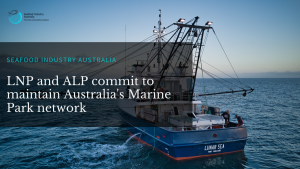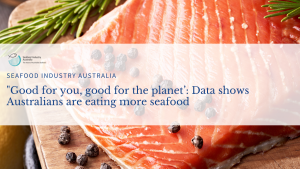The Hon Tanya Plibersek MP, Minister for the Environment and Water has unveiled a new draft South East Marine Parks Management Plan. Alongside this important plan to support biodiversity conservation has been the recent delisting, by Minister Plibersek, of Southern Bluefin Tuna (SBT) as a conservation-dependent species. The recovery of SBT stocks, following years of strict conservation measures, is hailed as a significant victory for Australia’s seafood industry.
However, the plan, designed to bolster marine biodiversity protection, has introduced new challenges. Industry leaders warn that while there are wins for conservation, reduced fishing access will have unintended consequences and consumers are likely to face higher seafood prices as fisheries grapple with shrinking grounds and rising costs.
Veronica Papacosta, CEO of Seafood Industry Australia (SIA), praised the extensive consultation process leading up to the plan, noting the significance of the Southern Bluefin Tuna delisting as proof of the industry’s commitment to sustainable practices.
“The increased level of consultation by the minister and her department has allowed us to engage meaningfully, resulting in balanced solutions that protect both marine biodiversity and the seafood industry’s future.”
Daniel Casement, CEO of the Australian Southern Bluefin Tuna Industry Association, celebrated the recovery of tuna stocks as a major accomplishment.
“The removal of Southern Bluefin Tuna from the EPBC Act’s conservation-dependent list is a testament to the strong recovery of SBT stocks under rigorous management. It’s crucial this recovery through an ongoing commitment to responsible resource management and research, translates into ongoing fishing access and economic opportunities for the SBT purse seine fishery.”
Flake fisheries facing harder times: higher fish and chip prices on the horizon
However, not everyone in the seafood industry is celebrating. Simon Boag, Executive Officer of the South East Trawl Fishing Industry Association (SETFIA), expressed concerns about the impact of the new marine park zoning on the shark (flake) fishery, a staple of Australia’s iconic fish and chips.
“The proposed South-East Marine Parks Plan will impact the shark (flake) fishery, which, given marine parks and other fishery closures, has now lost access to 90% of the grounds it had 20 years ago.”
Boag also highlighted the looming impact of offshore wind farms in Gippsland, which could further reduce access to key shark fishing areas. To alleviate these pressures, he proposed an industry-specific solution.
“The answer to rising fish and chip prices is management levy relief, given the new SE parks have reduced the risks associated with shark fishing. The industry is already under pressure, and additional closures and restrictions will make it harder to keep prices affordable for consumers.”
Striking the balance: conservation and industry coexistence
While the recovery of Southern Bluefin Tuna is a testament to successful resource management, the industry’s future hinges on maintaining access to key fishing grounds. The draft South-East Marine Parks Plan attempts to strike a delicate balance between conservation and industry needs, but there is no denying the strain it places on certain fisheries.
Austral Fisheries, which operates in the world-class Patagonian Toothfish fishery in the HIMI zone, celebrated the biodiversity outcomes of the plan while acknowledging the ongoing challenge of balancing conservation with industry needs.
“Austral acknowledges the challenge of finding the balance between conservation and the use of renewable natural resources. This plan puts responsible commercial fishing front and centre in this special part of the world, while also providing valuable protection for key habitats.”
“Industry calls on Government to ensure resources are provided to manage and monitor expanded protected area.”
The public consultation on the plan runs from 11 October to 14 November 2024, and the outcome will have lasting implications for marine biodiversity and Australia’s seafood industry.
Media contact
Sarah Bakic
Seafood Industry Australia
Communications Manager
comms@seafoodindustryaustralia.com.au







